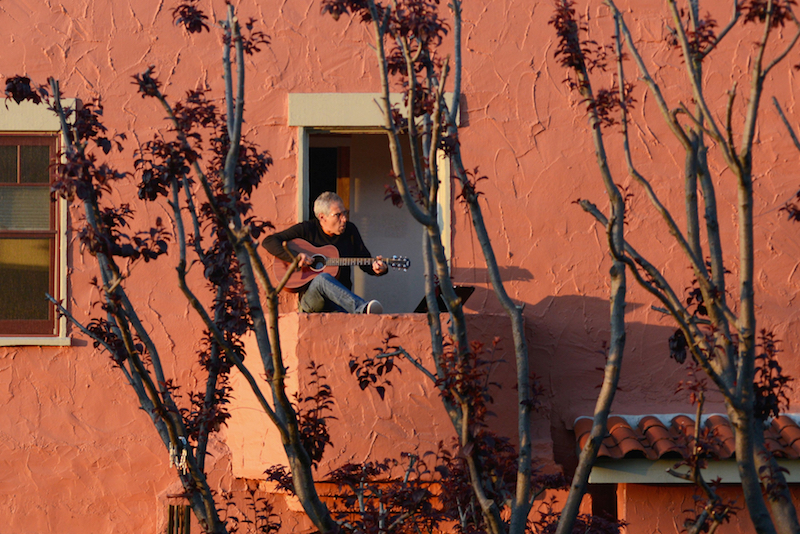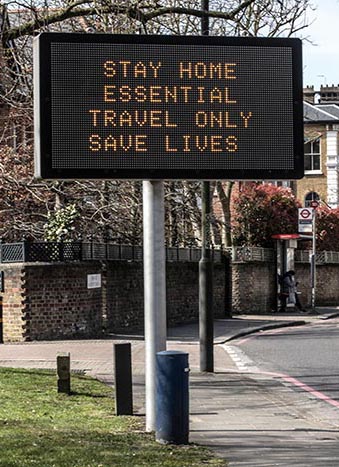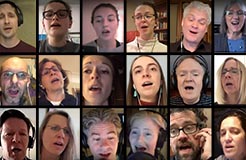Poems for These Times _|_ Issue 15, 2020
Poems for These Times: A Reflection
Jane Clark and Barbara Vellacott review the poetry series we presented during the Covid-19 lockdown, March – June 2020


Poems for These Times: A Reflection
Jane Clark and Barbara Vellacott review the poetry series we presented during the Covid-19 lockdown, March – June 2020
When the global pandemic of Covid-19 began to hit Europe and USA in March and the whole world went into a kind of retreat, those of us working on Beshara Magazine felt that we wanted to make a response to this unprecedented situation. We came up with the idea of a series of weekly poems, which turned out to be fourteen in number, ending on 28 June as the lockdown began to ease. You can see the whole collection by clicking here. In this article, Jane Clark and Barbara Vellacott, who edited the series, reflect upon the experience and present one final offering – ‘Touched by an Angel’ by Maya Angelou.
 Without going outside you may know the whole world. (Lao Tsu)
Without going outside you may know the whole world. (Lao Tsu)
Poetry engages the imagination, and can touch us deeply, body and soul; it can bring us to a sense of our common humanity. Therefore we could also say:
Through poetry we may know the whole world.
The aim of the fourteen ‘Poems for These Times’ was to connect imaginatively and compassionately with what humanity has been going through during the first months of the coronavirus pandemic, and to offer some spiritual help and support. We were not alone in thinking that poetry had a special role to play. As the UK lockdown started in March, it seemed to be everywhere – on the radio and TV, flooding into our inboxes from friends and colleagues – as people sought the guidance of perennial truths in the strange new world we found ourselves in. Poetry is not the only way to explore such things, of course, but in our multicultural and largely secular society it can have a universal appeal that other sources, such as religious writings, no longer achieve.
We started with a selection of a dozen or so poems that we felt had this universal quality, and decided to choose from them flexibly according to what we sensed was the mood of the moment. ‘Pandemic’ by Lyn Ungar was an obvious choice to start with. One of the first poems to circulate on the internet, it was written precisely for the times and struck a note of creative and sacred possibility. We wanted to offer just one poem each week, so that people could really stay with what was offered in a contemplative way. We also decided to present them with the minimum of commentary to allow readers to uncover meanings for themselves and relate them to their own situation.

A Unified Vision
.
Beyond the fundamental requirement that a poem had to be strong enough to stand alone, there were some guiding criteria for selection. At the most basic level, poems had to be in English for the magazine’s worldwide audience. This occasionally conflicted with our desire to have poems from other cultures, because translations sometimes do not read well. We found some lovely, pertinent sentiments, for instance, in the work of the Indian poet Rabindranath Tagore, but any poems we found that were right for our theme, while they no doubt sound beautiful in Bengali, seemed rather banal in the English versions. We did, however, discover some wonderful translations, such as the extract from Rilke’s ‘Tenth Elegy’ by Stephen Mitchell, the meditation by Lao Tsu, translated by Jane English and Paul E. Losensky, and Sunil Sharma’s rendering of the Ghazals of classical Indian poet, Amir Khusrau.
A linked consideration was that pieces had to be poetry (without entering into definitions of what that is) rather than teachings, or aphorisms. That is, they had to read musically. We looked at a great many texts from the mystical traditions of the world, but in most cases failed to find sufficiently lyrical passages. As the series developed, we found that we naturally aimed for a balance of qualities week to week, and ended up with what we hope was a pleasing variety of poetic styles – the weighty music of John Milton in Paradise Lost contrasting with the lyrical tone of Elizabeth Jennings in ‘Song of Time’, and the Jamaican rap style of Benjamin Zephaniah’s ‘The Old Truth’.
The most important criterion, however, was the need to be true to a unified vision of human experience, holding together both ‘happiness’ and ‘the dark’ in our overall picture. The Aramaic word beshara has the meaning of ‘good news’ and embodies a fundamentally optimistic approach both to the world and to human nature. But a comprehensive vision has to encompass the felt experience of suffering as well as the final reality of compassion. Therefore we looked for poems that did not flinch from acknowledging the existential dilemmas we were facing – and will continue to face – during the pandemic.
We chose Czeslaw Milosz’s poem ‘Before Majesty’ because it holds together faith and anguish in a stark and moving way, and were pleased to discover from the very positive response that our readers were with us on this matter. We got equally appreciative reactions to Jane Hirshfield’s ‘The Weighing’ and Rilke’s ‘Extract from the Tenth Elegy’ with its haunting line: “How we squander our hours of pain”, whilst Khusrau holds both beauty and human suffering in his exquisite ‘Ghazal 1836’:
… why else does
Khusrau begin
each early morning
to sing and lament
like the nightingale.
Death of course is the great issue which has confronted us throughout the coronavirus crisis. We thought much about this. There are plenty of poems about death – the final, undeniable end of human life. But so many deaths at once can shock the collective human psyche, and we asked: what can poetry offer? Musing over this, our attention was drawn to ‘The Dead’ by Rupert Brooke, written in the context of mass deaths during the First World War. It seemed to sound a true note for now. There is life and the experience of loss – “all this is ended” – as well as acceptance. This poem, together with Ted Hughes’ ‘A Green Mother’, with its tender and earth-oriented framing of death and its ‘aftertaste’, may remind us that death, however unwelcome, unjust or untimely, is not the worst thing that can happen to a human being.

Poem 7: Manaus, Brazil, the Parque Taruma Cemetery. Aerial view of a new section which has been opened during the COVID-19 pandemic. In the foreground, cemetery workers unload one of several coffins from a truck into a single grave. Photograph: Michael Dantas / AFP via Getty Images
Responding to the Moment
.
Our task at the beginning of each week was to respond sensitively and intuitively to ‘the times’ as they manifested both in the external world and personally, as we ourselves underwent the journey through lockdown, crisis and gradual emergence. We soon had to extend our initial list, embarking upon new searches as different, and sometimes unexpected, themes emerged, such as the fluidity of time (Elizabeth Jennings’ ‘Song of Time’); our mutual dependence (D.H. Lawrence’s ‘Trust’), and the experience of subtle connection which is expressed so beautifully in ‘The Instrument’ by Kathleen Raine:
… it may be that soul extends
Organs of sense
Tuned to waves here scarcely heard, or only
Heard distantly, in dreams…
The most vivid example of this process was Poem 11, for which we were planning to use Stevie Smith’s pithy ode on friendship (see below) at a time when, in Europe at least, people began to meet again in the open air. But then on 25 May, George Floyd was killed in Minneapolis, and ‘Black Lives Matter’ dominated the headlines all over the world. We spent two days searching through our books and the internet for a suitable offering from an African–American poet, but in the end, after one of us woke up early in the morning with a clear intuition about Milton’s Paradise Lost, we went for the pure lament expressed by Adam at the end of that great epic of the human condition – “O miserable mankind, to what fall // Degraded” – linking it to contemporary events with a picture of a prayer group in Dallas, Texas.
We tried to maintain a broad vision when choosing the poems, encompassing different ethnicities and cultures, the spiritual traditions of East and West, classical and modern, men and women. But although our researches were careful, they were inevitably far from exhaustive and reflected the limits of our own knowledge. We prioritised what we felt were good poetic responses, and found ourselves using the accompanying picture – which the magazine format requires – to show the global nature of the pandemic. The illustrations also allowed us to touch on some themes which were not covered by the poems: the drop in pollution levels; the closing of communal places of worship; the heroism of health workers, etc.
Finding these images proved far from straightforward, however. As soon as a picture is put next to a poem an interpretation creeps in, which can limit the poem or prescribe a response. We had a few struggles and debates over these choices, both between the two of us and with our photo editor, Judy Kearns, who was an essential part of the process throughout. We hope that keeping the photographs strictly related to human experience of the pandemic legitimised their use with poems also chosen especially ‘for these times’. Looking back, it seems that they form their own kind of record of an extraordinary period.

Poem 11: Dallas, Texas. Following the death of George Floyd on 25 May, Dallas Mavericks owner Mark Cuban stands with Rev. Stacey Brown and Dallas Police Chief Rene Hall (right) as they gather in prayer to ask for justice against racism. Photograph: 31 May 2020, Smiley N. Pool/Staff Photographer
The Ones that Got Away
.
We have looked at many wonderful poems over the last four months. As the series progressed, we also received many suggestions from readers, some of which they had written themselves, which we very much appreciated. We could not use all of them, and it is not necessarily a reflection on the value of a poem that it did not make it into the series. Some poems that ticked all the boxes were left out because they were already well known and circulating widely, such as Pablo Neruda’s ‘Keeping Quiet’ [/] and Gerald Manley Hopkins’ ‘God’s Grandeur’ [/]. Some we felt were not accessible enough, like ‘Angel of the Abyss’ by Michael Symmons Roberts [/], or contained references that, without discussion, could be misleading if one did not know the context, such as ‘One Foot in Eden’ by Edwin Muir. For some, their ‘moment’ just did not arrive. Of these, there is a lingering regret that we did not manage to include Stevie Smith’s eulogy to friendship in the open air –
The pleasures of friendship are exquisite.
How pleasant to go to a friend on a visit.
I go to my friend, we walk on the grass,
And the hours and moments like minutes pass. (1)
or Charles Causley’s lyrical ‘Timothy Winters’ [/] depicting childhood neglect and deprivation, which both expressed relevant themes.
But there we leave it, perhaps provoking as many questions as issues addressed. We trust that the project has offered new poems, opened up new thoughts, feelings or possibilities, and will keep us open to reading more poetry. We ended the series with a note of hope with Seamus Heaney’s The Cure at Troy, but there is never really a last word. So as a final bow, we present a poem from the African–American poet Maya Angelou which we have only just discovered – our thanks to the reader who sent it earlier this week – as sustenance in the no doubt challenging times which still lie ahead.
Touched by an Angel
by Maya Angelou
We, unaccustomed to courage
exiles from delight
live coiled in shells of loneliness
until love leaves its high holy temple
and comes into our sight
to liberate us into life.
Love arrives
and in its train come ecstasies
old memories of pleasure
ancient histories of pain.
Yet if we are bold,
love strikes away the chains of fear
from our souls.
We are weaned from our timidity
In the flush of love’s light
we dare be brave
And suddenly we see
that love costs all we are
and will ever be.
Yet it is only love
which sets us free.
Fourteen ‘Poems for These Times’
- Lyn Ungar: ‘Pandemic’
- Lao Tsu: Tao Te Ching, Chapter Forty-seven
- Czeslaw Milosz: ‘Before Majesty’
- D.H. Lawrence: ‘Trust’
- Jane Hirshfield: ‘The Weighing’
- Amir Khusrau: Ghazal 1836
- Rupert Brooke: ‘The Dead’
- Benjamin Zephaniah: ‘The Old Truth’
- R.M. Rilke: ‘Tenth Duino Elegy’ (extract)
- Elizabeth Jennings: ‘Song of Time’
- John Milton: ‘Adam’s Lament’, from Paradise Lost
- Ted Hughes: ‘A Green Mother’
- Kathleen Raine: ‘The Instrument’
- Seamus Heaney: ‘Human beings suffer…’, from The Cure at Troy
Image Sources (click to close)
Banner: Danny Wertheimer plays guitar and sings to his neighbours from his balcony two days after California’s Governor Gavin Newsom implemented a state wide ‘stay at home order’ to the state’s 40 million residents. Photograph: REUTERS/Kate Munsch TPX IMAGES OF THE DAY, March 21 2020
Inset: Signs across the city of London encourage people to stay at home during the Covid-19 pandemic. Photograph: Jeff Gilbert/Alamy Stock Photo
Other Sources (click to open)
1) STEVIE SMITH: ‘The Pleasures of Friendship’, in Mother, What is a Man (1942) (From The Collected Poems and Drawings of Stevie Smith, Faber & Faber, 2015)
Email this page to a friend
FOLLOW AND LIKE US
——————————————
——————————————
——————————————
FOLLOW AND LIKE US
If you enjoyed reading this article
Please leave a comment below.
Please also consider making a donation to support the work of Beshara Magazine. The magazine relies entirely on voluntary support. Donations received through this website go towards editorial expenses, eg. image rights, travel expenses, and website maintenance and development costs.
READ MORE IN BESHARA MAGAZINE
Poems for These Times: 2
Lao Tzu | Tao Te Ching, Chapter Forty-seven
“Without going outside, you may know the whole world…”
Poems for These Times: 5
Jane Hirshfield | The Weighing
“The heart’s reasons
seen clearly,
even the hardest will carry
its whip-marks and sadness…”
Poems for These Times: 10
Elizabeth Jennings | Song of Time
“Deliver time and let it go
Under wild clouds and passive moon.
Once it was fast, now it is slow…”
Poems for These Times: 14
Seamus Heaney | From The Cure at Troy
“… So hope for a great sea-change
On the far side of revenge.
Believe that further shore
Is reachable from here…”
READERS’ COMMENTS





Thank you, Jane and Barbara, for all your sensitive thought and consideration that went into choosing these poems. Very much appreciated.
We read this poem this morning in the Beshara Turkey Explorers Zoom meeting, with participants from Australia India Switzerland Spain Syria Scotland and India – thanks for this, very much the flavour of the morning.
Thank you to the Beshara Magazine team for this joint enterprise. The breadth and width of the poems have been extraordinary, with many sensitive images to enhance the experience. Congratulations to you all.
I feel sad that you left out “One Foot in Eden” by Edwin Muir. It seems the fate of this greatest and most moving of all Scottish writers always to be left out, so that he remains a hidden treasure. But at least you had the right poem in mind:
What had Eden ever to say
Of hope and faith and pity and love
Until was buried all its day
And memory found its treasure trove?
Strange blessings never in Paradise
Fall from these beclouded skies.
I enjoyed the poems very much. The poem by DH Lawrence was a wonderful discovery for me – I didn’t know how good a poet he was and was happy search out more. However, I can’t quite see why you would describe the translations of Tagore’ poetry as “banal” His own translations of Gitanjali are far from banal as W B Yeats’ praises in the introduction testify. One that would have been apt is:
“If thou speakest not I will fill my heart with thy silence and endure it. I will keep still and wait like the night with starry vigil and its head bent low with patience.
The morning will surely come, the darkness will vanish, and thy voice pour down in golden streams breaking through the sky.
Then thy words will take wing in songs from every one of my birds’ nests, and thy melodies will break forth in flowers in all my forest groves.”
The book can be found at: https://www.sacred-texts.com/hin/tagore/gitnjali.htm
Dear Jane, you have gone for the big names. I liked your resume very much. I studied Milton’s Paradise Lost for A Level. It ia a mighty work, whihc he wrote blind by dictation. It is worth visiting his house, if you have not done so. Prayers, Alan
Deep gratitude to the Beshara team for this inspirational idea,and for selecting poems with such sensitivity and discernment.
As a footnote to the comment by Iljas Baker on Tagore translations,I strongly recommend to readers the revelatory translations of both poems and songs by Ketaki Kushari Dyson (Bloodaxe).
1